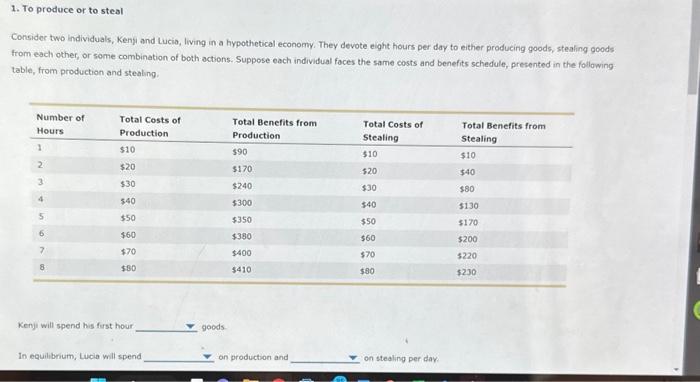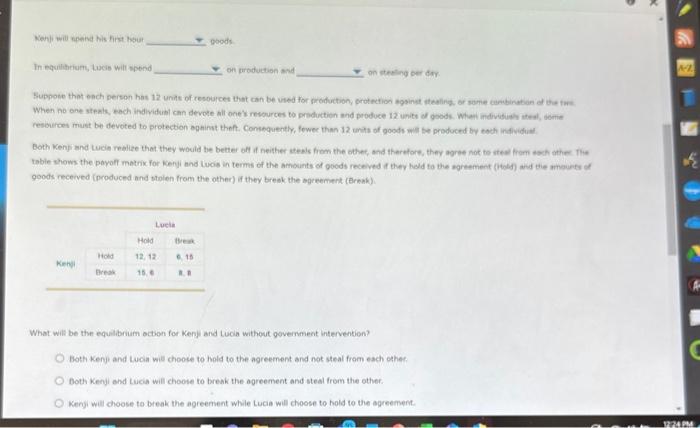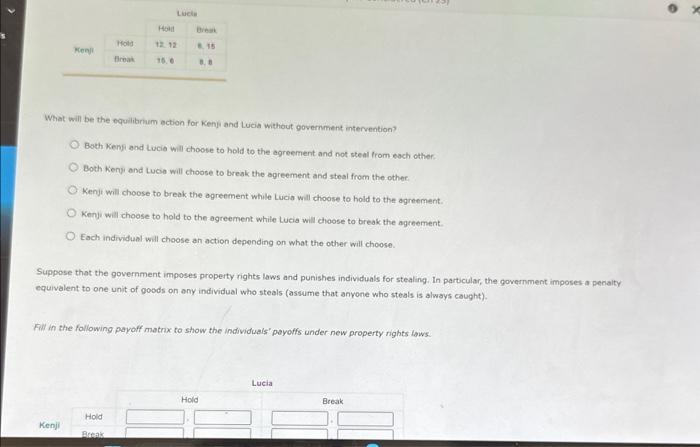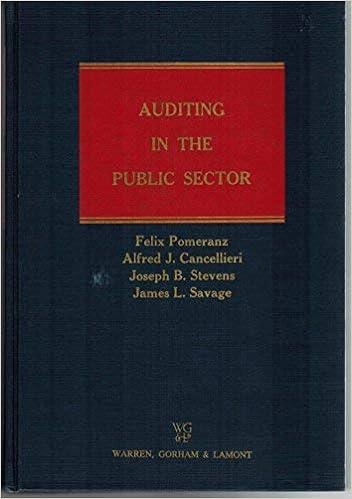Answered step by step
Verified Expert Solution
Question
1 Approved Answer
help me Consider two Individuals, Kengi and Lucio, living in a hypothetical economy. They devote eight hours per day to either producing goods, stealing goods
help me 



Consider two Individuals, Kengi and Lucio, living in a hypothetical economy. They devote eight hours per day to either producing goods, stealing goods from each other, or some combination of both actions. Suppose each individual foces the same costs and benefits schedule, presented in the following table, from production and stealing. Kenji will spend his ferst hour gocds In equilibrism, Lucio will spend on production and on stealing per day: Menjo wie nopend his first hou gowits In equithriums, lucse wilt spend on piroduction skd resigutes must be devoted to protection agninst theft. Conscquently, fowec than 12 anist of goods wilh be producted by kach individual goods recerved (produced and stolen from the other) if they bresk the sgreemenk (Brank). What wils be the equilibriam octon for Meny and Locia without goveinment intervention? Both Keny and Lucia will choole to hold to the agreement and not steal from each other. Doth Kenul and Lucia will choose to break the agreement and steal from the other. Kengi will choose to break the agreenvent while Lucia will choose to hold to the agreement. What will be the equilitrium action for Kenj and Lucia without govermment intervention? Both Keng and Lucia will choose to hold to the agreement and not steal from each other: Both keny and Lucia will choose to break the agreement and steal from the other. Kenji will choose to break the agreement while Lucia will choose to hold to the agreement. Keny will choose to hold to the-agreement while Lucia will choose to break the agreement. Each individual will choose an action depending on what the other will choose. Suppose that the government imposes property rights laws and punishes individuals for stealing. In particular, the govermment imposes a penaity equivalent to one unit of goods on any individual who steals (assume that anyone who steals is always caught). FW in the following payoff matrix to show the individuals" payoffs under new property rights laws. In this chse, Kiendi wis choose to the bgreement and locit wil choose to the sqrement. Assime that the government levies taves on both Kenjl and Lucia of an simount equivalent ta d umts of goods. Which of tive follewing is truie abeut the combined eflects of the property rights law and takation on Kany and Lucis? The govermment makes both keny and Lucio worse off. The govermment dons not make nither keny or Lucis better off or worbe of The oovernment makes both kenj and bucia better off. The governasent makes one person better oft and one worse off 



Step by Step Solution
There are 3 Steps involved in it
Step: 1

Get Instant Access to Expert-Tailored Solutions
See step-by-step solutions with expert insights and AI powered tools for academic success
Step: 2

Step: 3

Ace Your Homework with AI
Get the answers you need in no time with our AI-driven, step-by-step assistance
Get Started


